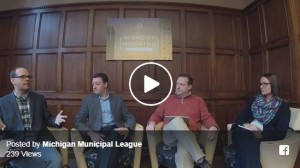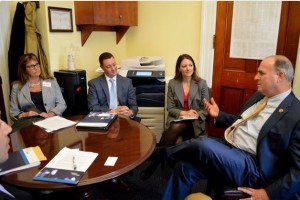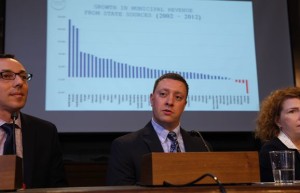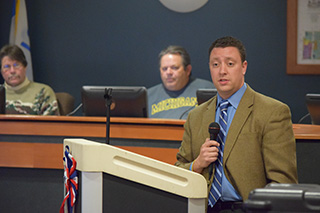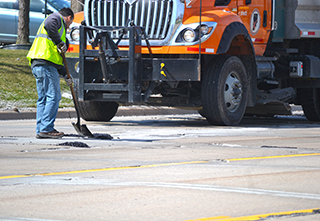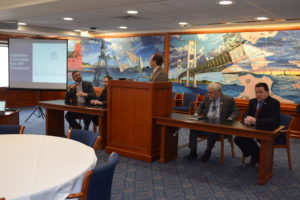 (View more photos from the event here).
(View more photos from the event here).
About 40 members of all the legislative committees of the Michigan Municipal League gathered this morning (Tuesday, Jan. 29, 2019) in Lansing to kick off the year.
The League event was highly successful as members from the League’s various legislative policy committees heard from state lawmakers, League staff and communications experts. The League’s State Affairs and Membership Engagement led the orientation event. We discussed the committee process and how the committee members can be effective advocates for the League and their own community.
The League makes policy decisions based on the input from its six League policy committees that are broken into topics – energy and environment; economic development and land use; municipal finance; municipal administration and permitting; municipal services and elections; and transportation, infrastructure and technology. View a list of all the committee members below.
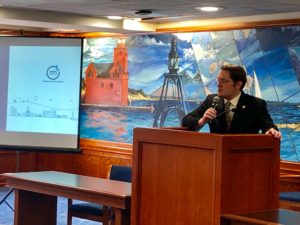
Representative Ben Frederick welcomes League committee members to Lansing.
The opening legislative speaker was Representative Ben Frederick, who welcomed the group to Lansing. He was followed by League CEO and Executive Director Dan Gilmartin who thanked the members for their service on the policy committees and explained how important their work is to the League’s success as an organization.
Other event speakers were Chris Hackbarth, director of state and federal affairs; John LaMacchia, assistant director of state and federal affairs; Jennifer Rigterink, legislative associate; Emily Kieliszewski, member engagement specialist; and Kelly Warren, director of member and affilate engagement for the League.
The panel included Michigan Senators Jim Stamas, and Jeremy Moss, and state Representatives Jeff Yaroch, and Jim Ellison.
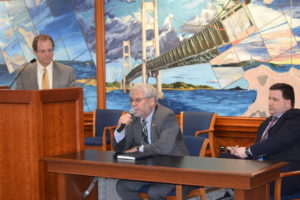
Legislative panel discussion at the League’s committee kick-off event.
The panel was moderated by Kyle Melinn of MIRS News Service. It was a great discussion about everything from revenue sharing to fixing the roads and it’s worth checking out.
Tuesday’s event was wrapped up with a panel discussion about communications, PR and the Insider’s Guide to Lobbying by Dave Waymire, partner with Martin Waymire and Mike Compagnoni, government relations with Midwest Strategy Group.
Here is a list of the 2019 committee members:
Economic Development and Land Use: Tim Wolff, (Chair), Village Manager, Lake Isabella; Greg E. Sundin, City Manager, City of Alpena; Suzanne Pixley, Mayor, Eastpointe; Brad Barrett, City Manager, City of Flushing; Michael A. Hart, Assistant City Manager, City of Fenton; Brad Kaye, City Manager, City of Midland; Jade Smith, City Administrator, City of Milan; Zach Michels, City Council Member, City of Dexter; Kara Wood, Director, Economic Development, Grand Rapids; Josh Jones, Councilmember, Menominee; Julius Suchy, Village Manager, Village of Sparta; Sharlan Douglas, Mayor Pro Tem, City of Royal Oak; Chris Miller, Economic Developer, City of Adrian; Michael Fisher, Chief Assistant City Attorney, City of Livonia; Timothy Dempsey, Deputy City Manager, East Lansing; MaryAlice Adams, Commissioner, Benton Harbor; Brian Urquhart, Planner/Zoning Administrator, Middleville; Scott Adkins, City Manager, City of Roseville; Gabriel Costanzo, City Councilmember, Walled Lake; Larry Moss, City Council, Greenville; Chad Ross, Frankenmuth City Council, Frankenmuth; Christine Zuzga, Planning Manager, Battle Creek; Erich Podjaske, Zoning & Economic Development Director, City of Grayling; Jennifer Cross, City Council Member, Norton Shores; Connie R. Mitchell, Councilwoman-District 6, Inkster; Mark Nickita, City commissioner, Birmingham; Caroline Kennedy, Assistant Village Manager, Elk Rapids; Patrick Reagan, City Manager, Crystal Falls; Willard Redman, Mayor Pro Tem, Hastings; Bob Craig, Vice-Mayor, City of St. Johns; Scott Smith, Mayor, South Haven.
Energy and Environment: Eric Zuzga (Chair), Village Manager, Village of Quincy; Joseph Sova, Utilities Director, City of Midland; Linda TerHaar, Councilmember, City of Saline; Fred Cowles, Government Affair Committee, Michigan Water Environment Association; Robert J Baldyga, City Counci, Portland; Robert Monetza, City councilmember, City of Grand Haven; James Godbout, Council President, City of Westland; Elizabeth Koto, City Planner, City of St. Clair Shores; George Sleeper, City Councilmember, South Haven; Melissa Stults, Sustainability and Innovations Director, Ann Arbor; Corey S. Blair, City Council, Algonac; Tony Graff, City Manager, City of Menominee; William Mogren, City Councilmember, North Muskegon; Ross Gavin, Councilmember, City of Berkley; Branden Dyer, Councilmember, Charlotte; Dennis Baldinelli, Mayor Pro Tem, Kingsford.
Municipal Administration and Permitting: Deborah Stuart (Chair), City Manager, City of Mason; Dave Hunsaker, Mayor Pro Tem, City of DeWitt; Clint Bryant, Councilmember, Saginaw; Ann Peterson, Councilmember, Rochester; David Quick, President, Village of Lawrence; Joseph Bippus, City Manager, City of Three Rivers; Don Bowers, City Council, Hastings; Aaron Desentz, City Manager, Eaton Rapids; Jim Kantola, Councilmember, Negaunee; Jeffrey Harris, City Administrator, City of Woodhaven; Brian Earle, Councilmember, Garden City; Doris Taylor, Councilmember, Pontiac; Steve Miller, Mayor, Ludington; Barbara Valentine, Village President, Mayville; Sanya Vitale, Community Development Director, City of Niles; Colleen O’Toole, City Manager, City of Durand; Brad Dick, City Councilor, City of Linden; James W. Hart, Councilmember, City of Westland.
Municipal Finance: Shea Charles (Chair), City Manager, City of Howell; Michael Lesich, Councilmember, Fraser; Brenda McNabb-Stange, Councilmember, City of Hastings; Brandon Fournier, Attorney, Southgate/Woodhaven; William Wild, Mayor, City of Westland; Oliver Turner, City Manager, Sault Ste. Marie; William Lasher, Mayor, Ovid; Matthew Lane, Village Manager, Village of St. Charles; Richard Lerner, Mayor Pro Tem, Farmington Hills; Marie Sherry, Treasurer/Finance Director, City of Dexter; Irv Lowenberg, Treasurer, City of Southfield; Brian Reed, Township Manager, Delta Township; James Wonacott, Village Administrator, Village of Blissfield; Brian Chapman, City Manager, City of Vassar; Dennis E. Champine, City Manager/City Clerk, City of Center Line; Jared Olson, City Manager, City of Roosevelt Park; Greg Mapes, Mayor, City of Alma; Dan Coss, City Administrator, City of DeWitt; Bill Colovos, Councilmember, City of Southgate; Dave Keenan, Assistant City Manager, Midland; Patrick Sullivan, City Manager, Northville; Stephanie Carroll, Manager, Business Development, City of Auburn Hills; Matthew V. Horning, Treasurer, City of Ann Arbor; Russell W. Whipple, Mayor, City of Mason; Rebecca Fleury, City Manager, Battle Creek; Thomas Youatt, City Manager, City of Imlay City; Tracy Bottecelli, City Councilmember, Fenton; David Trent, Village Manager, Village of Grass Lake; Lev Wood, City Councilmember, Grosse Pointe Farms; Derek Thiel, City Manager, Gibraltar; John Fournier, Assistant City Administrator, Ann Arbor; Brenda F. Moore, vice president of Michigan Municipal League,Councilmember, City of Saginaw; Pattie Rayl, Village Manager, Colon.
Municipal Services & Elections: Adam Smith (Chair), City Manager, City of Grand Ledge; Joshua Meringa, Council Member, City of Grandville; Monica Galloway, Councilmember, Flint; Michael Hikade, Councilmember, City of Newaygo; Marcus Peccia, City Manager, City of Cadillac; Mark L. Heydlauff, City Manager, City of Charlevoix; Sandra Howland, Walker City Commissioner, Walker City; Sam Janson, City Manager, City of North Muskegon; Thad Taylor, City Manager, City of Manistee; Lisa Hicks-Clayton, City Councilmember, City of Dearborn Heights; Frances McMullan, City Clerk, City of Ypsilanti; Edwina King, Policy Analyst, Detroit; Sean Canto, Fire Chief, Rochester Hills; Gregory Newman, City Clerk, City of Grand Ledge; Kelly Breen, City Councilmember, Novi; Pamela Colestock, City Council, Eaton Rapids; Chris Swope, City Clerk, Lansing; Carol Stone, Director of HR & Labor Relations, City of Midland; Kathleen Ling, City Commissioner, Mt. Pleasant; Brett Dreyfus, Township Clerk, Meridian Township; Gary Nelund, Mayor, Norton Shores
Transportation, Infrastructure & Technology: Gary Mekjian (Chair), Assistant City Manager, Farmington Hills; Howard Lazarus, City Administrator, Ann Arbor; Rock Abboud, President Pro Tem, Village of Beverly Hills; Devin Olson, City Manager, City of Munising; Michael Misteravich, Mayor Pro Tem, City of Richmond; Susan Baldwin, City Commissioner, City of Battle Creek; Amy Gilson, Director of Public Works, City of Charlotte; Darrel Schmalzel, City Manager, City of Walker; John Martin, City Manager, City of Sylvan Lake; Joe Valentine, City Manager, City of Birmingham; Jeffrey Jenks, City Commissioner, Huntington Woods; Lynn Markland, City Manager, Fenton; Todd Hackenberg, Superintendent of Public Works, Village of Lawton; Samuel E. Ekong, City Council member, City of Northville; Charlotte Kish, Council Woman, City Caro; Thomas E. Eustice, City Manager, City of Cheboygan; Mark Rambo, Deputy City Administrator, City of Kentwood; Tim O’Donnell, Mayor Pro Tem, Ferrysburg; Michael A. LePage, Village President, Pigeon; John Niemela, City Manager, City of Belding; Michael Radtke Jr., Councilman, Sterling Heights; Christian Wuerth, Village Manager, Village of Milford, Carl L Hamann, Village Councilmember, Village of Sanford; Richard Sullenger, City Engineer, City of Alpena; Bob Kittle, City Council & Munetrix, Auburn Hills; William H. Irving, Assistant Corporation Counsel, City of Dearborn; Joshua Fredrickson, City Engineer, City of Midland; Tim Neumann, Executive Director, Michigan Rural Water Association.
(View more photos from the event here).








